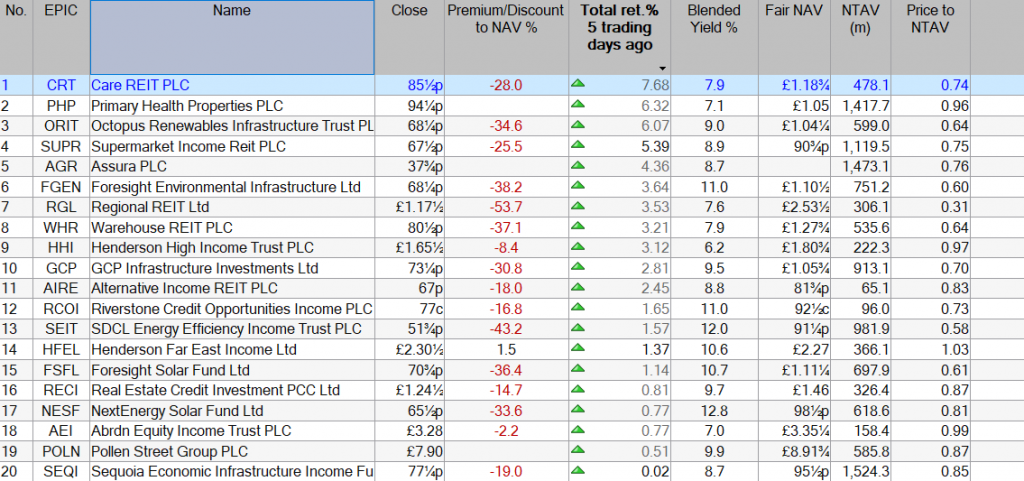The Results Round-Up: The week’s investment trust results
Hat trick of funds this week: Henderson Smaller Companies HSL (along with the rest of the sector) finds the going tough because there’s too much doom and gloom; Patria Private Equity PPET reports a +24.9% share price total return in what was a ‘year of ‘transition’; and CT Global Managed Portfolio Trust CMPI/G is ready for some new news after a sedate first half for both the fund and the market.

By Frank Buhagiar

Henderson Smaller Companies (HSL) thinks there’s too much doom and gloom
HSL reported a -3.8% net asset value (NAV) total return for the latest half year. Neither the benchmark nor HSL’s peers fared much better: the Deutsche Numis Smaller Companies ex-Investment Companies Index managed to squeak into positive territory, up +0.8%, while the AIC UK Smaller Companies sector average NAV was down -1.1%. That points to challenging markets. As Chair Penny Freer notes “headwinds to performance, (were) driven primarily by rising bond yields which continue to hamper economic recovery and put pressure on company valuations.”
Despite the difficult first half, Freer believes, “there is evidence that too much doom and gloom has been priced into the market following the Budget.” For “Whilst interest rates may be cut more slowly, in contrast to the last decade, their relatively high starting point provides a strong and stimulating lever for policy makers to pull on should economic activity slow further.” And then there are valuations. According to the fund managers “the equity market is trading below its long-term averages.” That may be partly down to uncertainty “around short-term economic conditions.” Not that the fund managers sound too concerned “we think that the portfolio is well positioned both to withstand current challenging economic conditions and to participate in any potential upswing.” A portfolio for all seasons then. Market hedging its bets too – shares edged a penny higher to close at 810p.
Winterflood: “Underperformance attributed to stock selection, gearing and expenses. Negative contribution from stock selection including rising bond yields having detrimental impact on valuations of HSL’s predominantly pro-cyclical and interest rate sensitive portfolio. In addition, a ‘small number’ of company-specific issues impacted performance; the managers believe these issues are temporary or more than fully reflected in share prices and expect these companies to recover over time.”
Numis: “HSL remains one of our top picks within the UK smaller companies sector. The managers, Neil Hermon and Indri van Hien, follow a stock-picking approach focused on growth at a reasonable price (GARP). We rate the experienced management team highly, despite a period of poor performance, and welcome the news of Indriatti’s appointment as co-PM. The fund retains its strong long term track record, with NAV total returns of 1,215% (12.3% pa) compared to 792% (10.3% pa) for its benchmark, since Neil’s appointment in November 2002. The shares are currently trading on a c.12% discount to NAV, which we think is a good entry point for an attractively valued portfolio.”
Patria Private Equity’s (PPET) busy year
PPET’s share price total return of +24.9% stole the show in the latest full-year results. That compares to the NAV total return which, at +2.4%, was lower than the long-term average. Foreign exchange movements largely to blame. Strip these out and the portfolio return in local currency terms was +8.8%. Not bad going then, particularly as Chair Alan Devine notes, “The last 12 months have been a year of transition since our Manager had a change in ownership and, as a result, the Board rebranded the Company to Patria Private Equity Trust plc.” And if that wasn’t enough, “At the same time, we appointed a new corporate broker, launched a share buyback programme and conducted a successful secondary sale of a non-core portfolio of fund investments.” Phew.
Looking ahead, Devine is feeling “optimistic about PPET going forward.” Optimism is centred around a pick-up in private equity investment activity, as “Increased activity will drive portfolio company exits and cash distributions and should in theory act as a tailwind to NAV growth, since exits are typically realised at an uplift to prior valuation.” And, as the investment manager points out, “The PPET portfolio continues to perform resiliently and remains well-positioned for a pick-up in activity levels. As such, we are excited about the potential for PPET as we look forward to 2025.” Finally, good to see the Chair beating the drum for investment trusts “I continue to believe that investment trusts are the best way for smaller investors to access private equity, due to features like daily liquidity, the evergreen nature of the portfolios and long-term track records”. Well said, sir. Market liked what it heard too – shares tacked on 5p to close at 562p.
JPMorgan: “The valuation multiples for most of the portfolio seem reasonable and they have delivered good revenue and EBITDA growth and are not excessively leveraged. The current price of 553pps implies a headline discount of 29.9%. Taking into account listeds, and also look-through fund level debt, the implied discount on the unlisted is similar at 29.3%. This remains a little narrower than peers and so we see no reason to change our Neutral recommendation.”
Numis: “Key performance drivers included uplifts on exits (26% average uplift) and double-digit portfolio earnings growth (18%) which covers c.64% of the portfolio. It is positive to see PPET buying back more shares in recent months, helped by an improved balance sheet given the sale of a secondary portfolio of fund investments. The secondary sale completed at a c.5% discount, which demonstrates the value in the Listed PE sector, with PPET’s shares currently trading on a c.29% discount to our estimated NAV, which we believe is excessive and offers value, along with a number of other LPE ICs.”
CT Global Managed Portfolio Trust (CMPI/G) ready for some new news
CMPI / CMPG reported a +0.6% NAV total return for the Income shares and a +1.9% return for the Growth shares for the half year, the latter in line with the FTSE All-Share’s +1.9%. In his statement, Chairman David Warnock lists a number of uncertainties – inflation, interest rates and the economic impact of the UK and US elections. But as Warnock points out, “None of these observations is new news and so should be discounted already by stock markets. As ever, markets respond in either direction to events or news that is not discounted.”
Having said that, markets could well have a fair bit of new news to digest soon. “With a new and seemingly quite unpredictable US President having taken office, the potential for new news is even higher than usual.” Just as well then that “The Board and Manager believe the portfolios comprise quality investment companies and are well diversified. In particularly uncertain times, these characteristics should encourage investors, whatever new news appears.” Market waiting to see what this new news will be – both classes of shares were unmoved on results day.
Winterflood: “Growth Shares: NAV TR +1.9%, in line with performance of FTSE All Share. Principal contributors were investment trusts exposed to US stock market. Key contributors were JPMorgan American (JAM), Allianz Technology Trust* (ATT) and Polar Capital Technology (PCT). Income Shares: NAV TR +0.6% vs FTSE All Share +1.9%. Underperformance driven by lack of exposure to investment trusts invested in US stock market.”



